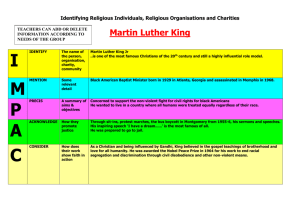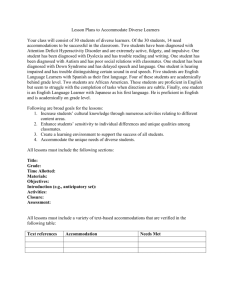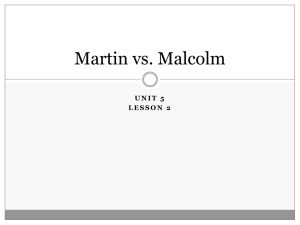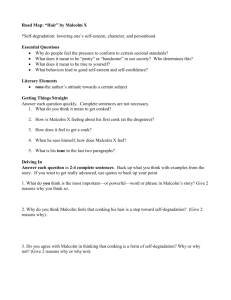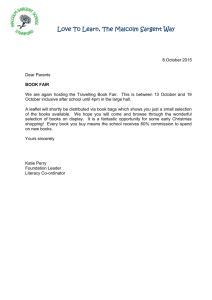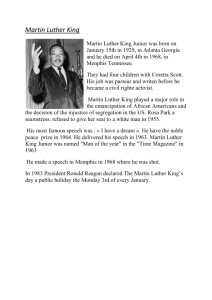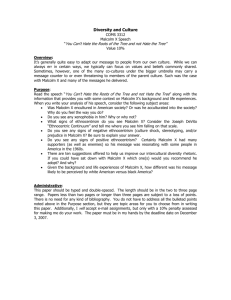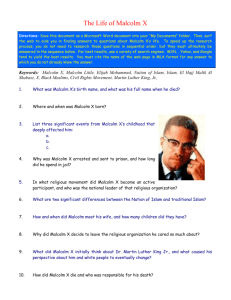Chapter 6 Martin Luther King & Malcolm X on
advertisement
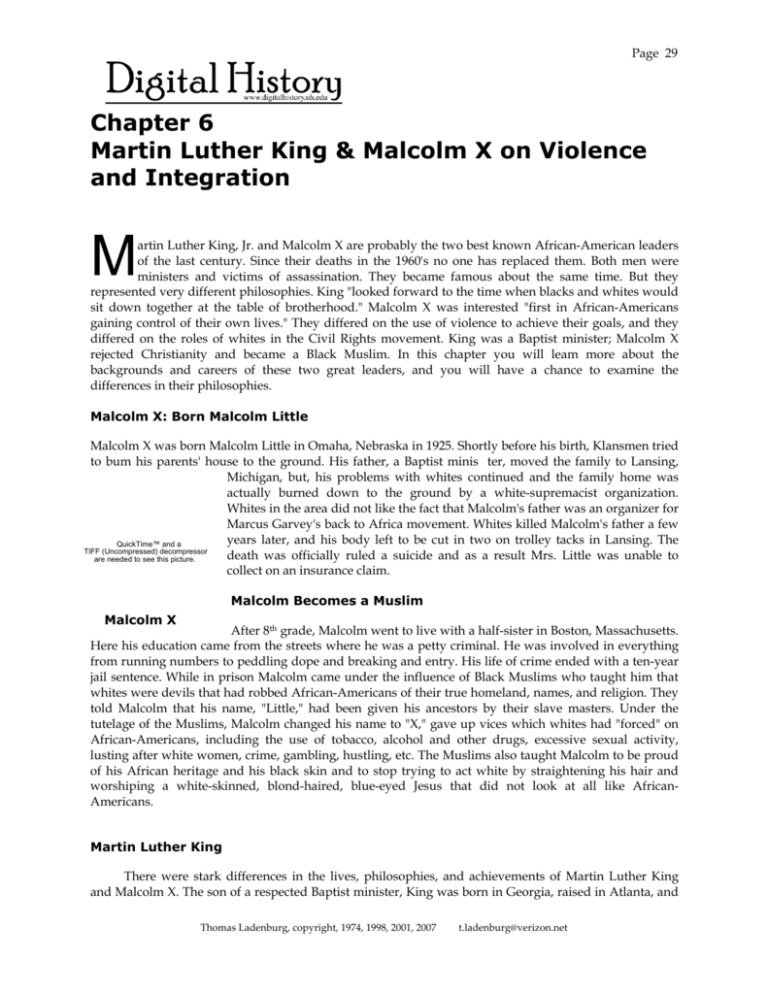
Page 29 Chapter 6 Martin Luther King & Malcolm X on Violence and Integration M artin Luther King, Jr. and Malcolm X are probably the two best known African-American leaders of the last century. Since their deaths in the 1960's no one has replaced them. Both men were ministers and victims of assassination. They became famous about the same time. But they represented very different philosophies. King "looked forward to the time when blacks and whites would sit down together at the table of brotherhood." Malcolm X was interested "first in African-Americans gaining control of their own lives." They differed on the use of violence to achieve their goals, and they differed on the roles of whites in the Civil Rights movement. King was a Baptist minister; Malcolm X rejected Christianity and became a Black Muslim. In this chapter you will leam more about the backgrounds and careers of these two great leaders, and you will have a chance to examine the differences in their philosophies. Malcolm X: Born Malcolm Little Malcolm X was born Malcolm Little in Omaha, Nebraska in 1925. Shortly before his birth, Klansmen tried to bum his parents' house to the ground. His father, a Baptist minis ter, moved the family to Lansing, Michigan, but, his problems with whites continued and the family home was actually burned down to the ground by a white-supremacist organization. Whites in the area did not like the fact that Malcolm's father was an organizer for Marcus Garvey's back to Africa movement. Whites killed Malcolm's father a few years later, and his body left to be cut in two on trolley tacks in Lansing. The QuickTime™ and a TIFF (Uncompressed) decompressor death was officially ruled a suicide and as a result Mrs. Little was unable to are needed to see this picture. collect on an insurance claim. Malcolm Becomes a Muslim Malcolm X After 8th grade, Malcolm went to live with a half-sister in Boston, Massachusetts. Here his education came from the streets where he was a petty criminal. He was involved in everything from running numbers to peddling dope and breaking and entry. His life of crime ended with a ten-year jail sentence. While in prison Malcolm came under the influence of Black Muslims who taught him that whites were devils that had robbed African-Americans of their true homeland, names, and religion. They told Malcolm that his name, "Little," had been given his ancestors by their slave masters. Under the tutelage of the Muslims, Malcolm changed his name to "X," gave up vices which whites had "forced" on African-Americans, including the use of tobacco, alcohol and other drugs, excessive sexual activity, lusting after white women, crime, gambling, hustling, etc. The Muslims also taught Malcolm to be proud of his African heritage and his black skin and to stop trying to act white by straightening his hair and worshiping a white-skinned, blond-haired, blue-eyed Jesus that did not look at all like AfricanAmericans. Martin Luther King There were stark differences in the lives, philosophies, and achievements of Martin Luther King and Malcolm X. The son of a respected Baptist minister, King was born in Georgia, raised in Atlanta, and Thomas Ladenburg, copyright, 1974, 1998, 2001, 2007 t.ladenburg@verizon.net Page 30 lived in a prosperous but segregated neighborhood. His stern but loving father taught Martin Jr., as well as his brother and sister, the value of hard work, and he instilled in them a strong faith in God. With a few notable exceptions, Martin was spared exposure to the pains of racial discrimination. He sang in the church choir at the age of four, skipped two years of high school, enrolled in an all-black college when he was only fifteen years old, and preached his first sermon at seventeen. He was one of only six AfricanAmerican students in his theology school, but he was elected class president and earned the admiration of his white classmates with his eloquent oratory, exemplary scholarship and sound judgments. After graduation he attended Boston University where he earned his PhD and met and later married Coretta Scott, a music major. King’s first ministry was at the Ebeneezer Church in Montgomery, Alabama in 1954, the same year as the famous Brown v. Board of Education decision banning racial segregation in public education. When, in December of 1955, Mrs. Rosa Parks was arrested for refusing to surrender her seat at the front of a bus to a white man, King helped organize and lead the Montgomery Bus Boycott. His inspired leadership sparked the Civil Rights Movement nationwide and in August 1963, was demonstrated for all the world to hear in his famous “I Have a Dream” speech. Martin Luther King’s speeches and personal contacts with the nation’s leaders were responsible for successful nationwide sit-in campaigns and the passage of the Civil Rights Act of 1964 and the Voting Rights Act of 1965. His non-violent leadership in the name of justice for African-Americans and his staunch opposition to the war in Vietnam earned him the Nobel Peace Prize. Following his assassination on April 4, 1968, King’s birthday has been declared a national holiday. He is honored to this day as the man who reminded all Americans that the unjust system of racial segregation violated the principles on which their nation was founded. Thomas Ladenburg, copyright, 1974, 1998, 2001, 2007 t.ladenburg@verizon.net Page 31 Different Philosophies of Martin Luther King and Malcolm X On the Role of Whites in the Civil Rights Movement Martin Luther King Malcolm X Another group with a vital role to play in the present crisis is the white Northern liberals. The racial issue which we confront in America is not a sectional but a national problem. The citizenship rights of Negroes cannot be flouted anywhere without impairing the rights of every American. Injustice anywhere is a threat to injustice everywhere. A breakdown of law in Alabama weakens the very foundations of lawful government in the other 47 states. The mere fact that we live in the United States means that we are caught in a network of inescapable mutuality. Therefore, no American can afford to be apathetic about the problem that meets every man in his front door. 17 The racial problem will be solved in America to the degree that every American considers himself personally confronted with it. Whether one lives in the heart of the Deep South, or in the North, the problem of injustice is his problem; it is his problem because it is America’s problem. 18 Brothers, the white man can’t give you the solution. You will never get the solution from any white liberal. Don’t let them come in and tell you what we should do to solve the problem. Those days are over. They can’t do it and they won’t do it. That’s like asking the fox to help you solve the problem confronting the wolf. … He’ll give you a solution that will put you right in his clutches and this is what the white liberal does. Very seldom, you will notice you will find whites who can in any way put up with black nationalists. Haven’t you ever wondered why? I mean even the most liberal whites can’t get along with black nationalist. He can’t just stomach it. But he can go along with anything that is integrated, because he knows he can get in there and finagle it, and have you walking backwards thinking you’ll be waking forwards, No, we don’t want that.19 On Integration Martin Luther King I say to you today, even though we face the difficulties of today and tomorrow, I still have a dream. It is a dream deeply rooted in the American dream. I have a dream that one day this nation will rise up, live out of the true meaning of its creed: ‘We hold these truths to be self-evident, that all mean are created equal.’ Malcolm X [American society] is already divided on racial lines. Gpo to Harlem. All we’re saying now is since we’re already divided, the least the government can do is let us control the areas where we live. Let the white people control theirs, let us control ours—that’s all we’re saying. If the white man can control his, and actually what he is using to control it is with white nationalism in the white communities whether they are Jews, whether I have a dream that one day on the red hills of they are Protestants — they still practice white Georgia, sons of former slaves and the sons of nationalism. O all we’re saying to our people is to forget former slave owners will be able to sit down our religious differences. Forget all the differences that toe\gethe5 at the table of brotherhood. I have a have been artificially created by the whites who have dream that one day even in the state of Mississippi, been over us, and try and work together in unity and a state weltering with the heat of injustice, weltering harmony with the philosophy of black nationalism, with the heat of oppression will be transformed into which only means that we should control our own 17 Martin Luther King, Jr. Stride Toward Freedom, New York: Harper and Row, 1958, p. 199. 18 Martin Luther King, Jr. Letter from Birmingham Jail. Quoted in Lynne Inniello, ed., Milestones Along the March.,1966, pp. 71-72. 19 Quoted in Betty Shaazz, ed. Malcolm X on Afro-American History, New York: Pathfinder Press, Inc., 1970, pp. 48-49. 20 Martin Luther King, I Have A Dream, speech Thomas Ladenburg, copyright, 1974, 1998, 2001, 2007 t.ladenburg@verizon.net Page 32 an oasis of freedom and justice. economy, our own politics, and our own societ7. Nothing is wrong with that. I have a dram that my four little children will one day live in a nation where they will not be judged by the color of their skin, but by the content of their character. This will be the day when all of God’s children will be able to sing with new meaning, let freedom ring.,” So let freedom ring from the mighty hilltops of New Hampshire. Let freedom ring from the mighty mountains of New York. But not only that. Let freedom right from Stone Mountain of Georgia. Let freedom right from every hill and molehill of Mississippi, from every mountainside.20 And then, after we control our society, we’ll work with any segment of the white community towards building a better civilization. But we think they should control theirs and we should control ours. Don’t let us try and mix with each other because every time that mixture takes place we always find that the lack man is low man on the totem pole.21 On Violence Martin Luther King Malcolm X It is dangerous to organize a movement around selfdefense. The line separating defensive violence and aggressive violence is very thin. The minute a program of violence is enunciated, even for selfdefense, the atmosphere is fill with talk of violence, and the words falling on many ears may be interoperated as an invitation to aggression. Since self-preservation is the first law of nature, we assert the Afro-American’s right of self-defense. The Constitution of the USA clearly affirms the right of every American citizen to bear arms. And s Americans we will not give up a single right guaranteed under the Constitution. In violent warfare, one must be prepared to face the fact that there will be casualties in the thousands,. Anyone leading a violent rebellion must be willing to make an honest assessment regarding the possibility of casualties to a minority population confronting a wellarmed, wealthy majority with a fanatical right wing that would delight in killing thousands of black men, women, and children. The history of unpublished violence against our people clearly indicates that we must be prepared to defend ourselves or we will continue to be a defenseless people at the mercy of a ruthless and violent racist mob. We assert in those areas where the government is either unable or unwilling to protect the lives and property of our people, that our people are within their rights to protect themselves by whatever means Fewer people have been killed in ten years of non- necessary. A man with a rifle or a club can only be violent demonstrations across the South (1955-65) stopped by a person who defends himself with a rifle or club. than were killed in one night of rioting in Watts. The ultimate weakness of violence is that it is a descending spiral, begetting the very thing it seeks to destroy. Instead of diminishing evil, it multiplies it. Through violence you may murder the liar, but you cannot murder the lie, nor establish the truth. Through violence you may murder the hater, but you do not murder hate. In fact, violence merely increases hate. So it goes. Returning violence for violence multiplies violence, adding deeper darkness to a night already devoid of stars. Darkness cannot drive out darkness: only light can do that. Hate cannot drive out hate: only love can do that. Tactics based solely on morality can only succeed when you are dealing with basically moral people or a moral system. A man or system which opposes a man because of his color is not moral. It is the duty of every African-American community throughout this country to protect its people against mass murderers, bombers, lynchers, floggers, brutalizers and exploiters. 21 . Quoted in George Breitman, ed. The last Year of Malcolm: The Evolution of a Revolutionary, New York: Pathfinder Press, Inc., 1970, pp. 106-107. Thomas Ladenburg, copyright, 1974, 1998, 2001, 2007 t.ladenburg@verizon.net Page 33 Student Exercises: 1. Explain how you think Martin Luther King’s and Malcolm X’s philosophies were influenced by their experiences when they were children and young men. 2. Select three phases from King’s or X’s the speeches and writings, and come to class prepared to explain in your own words why they are meaningful to you. Thomas Ladenburg, copyright, 1974, 1998, 2001, 2007 t.ladenburg@verizon.net
